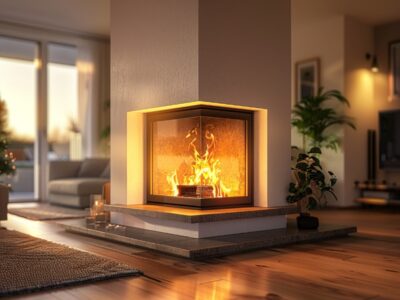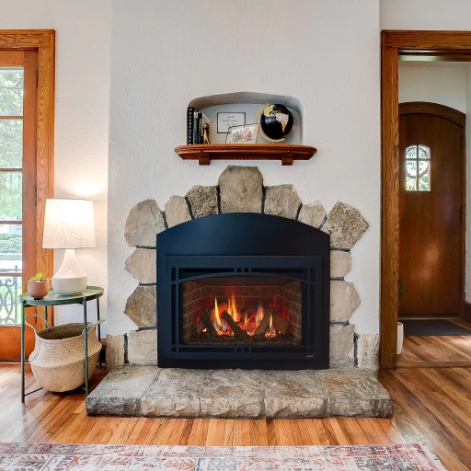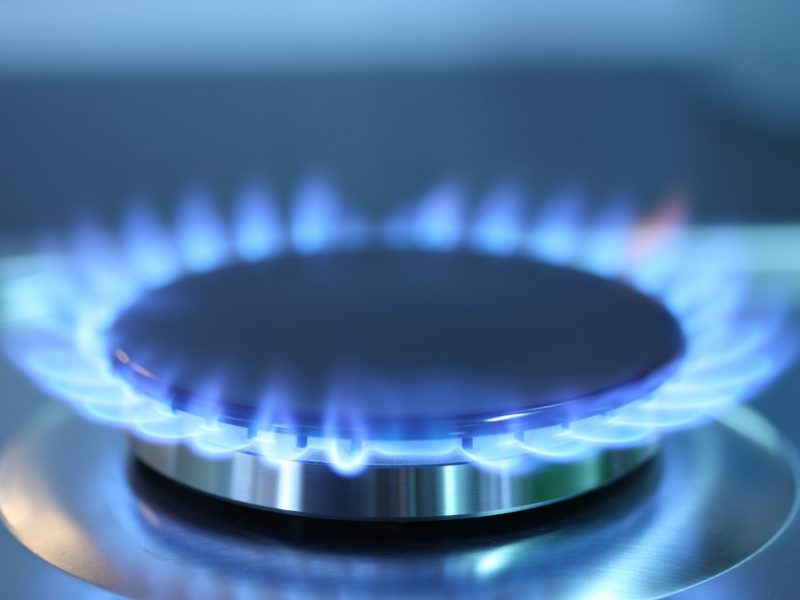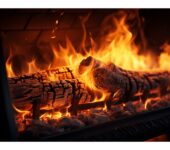Table of Contents
Does your gas fireplace smell? Are you wondering what is causing this strange and unpleasant odor?
If so, you aren’t alone.
While some odors are normal, others are not only annoying but potentially dangerous. For example, the smell of rotten eggs indicates a potential gas leak. A gas smell also means the potential of an explosion or other issues.
Here you can learn more about what’s causing a strange smell in your gas fireplace and how to fix the issue.
Smells Caused by Seasonal Burn Off
If you have a gas fireplace in your home, you probably love using it during winter. However, during spring and summer, they likely remain dormant.
The side effect of not using the unit is that when fall rolls around and you fire it up again, you may notice your gas fireplace stinks.
It is completely normal if you smell burnt plastic or a similar odor. You may also smell a distinct “burning” odor if there is dust, dirt, or other debris inside the unit. While you can clean this off before turning the unit on, it’s unnecessary.
After a few fires, the bad odor will dissipate, and you won’t have to worry about it again.
You Notice Smells After a New Unit is Installed
There’s nothing quite as exciting as smelling a strange odor when you turn a gas fireplace on for the first time after installation.
This is normal. Like other devices manufactured in a factory, gas fireplaces are made with paints, lubricants, and other processes that leave debris present. When you use the fireplace for the first time, noticing a strange odor isn’t unusual.
When you first turn on a new gas fireplace, try to open a window. This will let fresh air come into your home.
The smell should be gone after a few hours of using the fireplace.
You Notice Kerosene Odors
You can purchase gas fireplaces in different styles, including those with vent-less and vented burning.
These units rely on natural gas emissions to keep things going. If you notice the smell of kerosene, it’s caused by the byproducts of burning vent-less gas logs.
Vent-less vs. Vented Gas Logs
When you burn wood or other combustible materials, smoke and combustion gases are directed through the flue passage in the chimney. The process is called venting.
With gas fireplaces, you can choose between vented gas logs and venting the combustion gases, or you can use vent-less gas logs. With vent-less gas logs, there are no gases or smoke produced.
While this is true, you may notice the fireplace smells like kerosene with vent-less logs. This is most noticeable if you have the flue vents closed.
Combustion Processes That Cause Smells with Vent-less Gas Logs
Vent-less gas logs burn with no ventilation. Because of this, the combustion process works a bit differently regarding how heat is generated.
With vented gas logs, for example, the draft created by the flue plays a role in combustion (burning). The draft also works to pull gases and smoke up and deposit them in the outside air.
However, if you have vent-less logs, the hydrogen and carbon materials found in the natural gas will recombine with hydrogen and oxygen to create water vapor and carbon dioxide. This results in the fireplace producing heat.
When natural gas isn’t burnt completely, the fireplace emits kerosene as a byproduct, and as a result, the kerosene smell you notice.
Improper Cleaning May Cause a Gas Fireplace Smell
Just like traditional wood-burning fireplaces, gas fireplaces require regular cleaning and maintenance.
If you don’t clean the gas fireplace or hire someone to do it for you, it may create an odor.
In most cases, no maintenance or cleaning can result in smells when the fireplace is and is not in use.
Gas Fireplace Smells That Indicate an Emergency
If you notice a gas smell coming from your fireplace, you should take it seriously. You can usually ignore an odor created after the initial startup, dust burn-off, or even a kerosene odor. After all, these will fade after a few hours (in most cases).
However, if you notice a gas smell, act immediately. This is true whether you are using the fireplace or not.
Some situations that may cause your gas fireplace to smell like gas include:
- A gas leak from one of your plumbing assemblies
- Exhaust that spills back into your home
A leak in a plumbing assembly that goes to your fireplace could occur with the unit off or on. It can cause propane or natural gas to accumulate in a semi-contained area, such as the fireplace or nearby structure.
When this happens, the situation needs to be fixed immediately. If it is not, it can cause a fire or explosion.
Sometimes, gas odors are caused by the fireplace spilling exhausts. While these should be sent up the flue, they aren’t and wind up in your house.
In this situation, the smell may not be exactly what you are used to when it comes to natural gas. Instead, it will smell like you have left your oven’s burners on too long.
If this happens, you must figure out why your fireplace isn’t drafting properly. Your health and your family’s health can be affected by carbon monoxide accumulating in your home.
Remember, carbon monoxide doesn’t smell like gas. That’s why you must be careful to act if any gas odor is noticed.
Reduce the Stink with a Well-Designed Gas Fireplace System
When you have a gas fireplace that is properly designed and installed and a well-maintained chimney, you can reduce the possibility of a bad gas fireplace smell.
While smells aren’t always 100% preventable, there are steps you can take to make them less frequent and know when it’s an emergency.
Are you ready to have a gas fireplace installed in your home? If so, contact us today. Our experienced team will help you choose the right gas fireplace and install it in your home.
Latest Articles

How Much Do Wooden Garage Doors Cost?
Table of Contents1 Factors That Affect the Cost of Wooden Garage Doors2 Average Cost of Wooden Garage Doors3 Additional Costs to Consider4 Benefits of Choosing

Why Does My Fireplace Have So Much Cold Air Infiltration?
Table of Contents1 Understanding Cold Air Infiltration in Fireplaces2 What Causes Cold Air Infiltration in Fireplaces?3 How to Detect Cold Air Infiltration in Your Fireplace?4

Can I Have A Fireplace In My Sunroom?
Table of Contents1 Pros and Cons of Having a Fireplace in a Sunroom2 Types of Fireplaces for Sunrooms3 Factors to Consider Before Installing a Fireplace



















































































